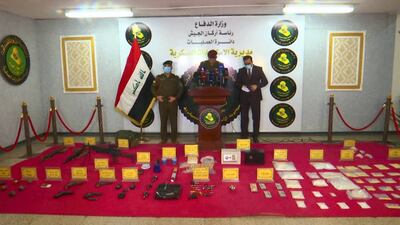Drug trafficking and abuse are growing rapidly in Iraq, transforming the country from merely a corridor for smuggling drugs to neighbouring countries and posing a new challenge to the conflict-ridden nation.
With the increased flow of drugs such as Captagon and methamphetamine from neighbouring countries in recent years, security and health officials are saying that the situation is reaching dangerous levels and authorities can not deal with it because of limited resources.
“Honestly, it’s a problem,” Col Ziyad Al Qaisi, spokesman for the Interior Ministry’s Anti-Drugs Department, told The National.
“It needs co-operation from all sides – even from the international community,” he said.
Captagon in the Middle East
Crystal meth is widely used in Iraq, making up 60 per cent of the country’s drug trade, the Health Ministry’s adviser on psychological wellness, Dr Emad Abdul-Razaq, told The National.
But Captagon has become the second most widely used drug in the country, Mr Abdul-Razaq said, having overtaken Tramadol, heroin and hashish in terms of use.
During the first half of this year, authorities seized about 420 kilograms of crystal meth and 50 to 60 million tablets of Captagon, more than 20 times the amount seized in the past two years combined, according to Interior Ministry figures.
Counter-narcotics authorities also seized more than 600 kilograms of hashish and about 30 kilograms of opium during the same period, a significant increase from the past two years, the statistics show.
Drug smugglers are finding creative ways to conceal their drugs; in shipments of pomegranates, goods, car parts and even the human body, Col Al Qaisi said.
For Col Al Qaisi, the drug trade is an even greater threat than terrorism.
“Terrorism and drugs are two sides of the same coin, but we see drugs as more dangerous than terrorism. You can see the terrorists and fight them, but you can’t see the drugs that kill the society in cold blood,” he said.

Three security officials, one with the Interior Ministry’s Intelligence Service and two with the National Security and Defence Ministry, blamed the explosion in trafficking on porous borders, widespread corruption among security forces and a lack of co-operation between government agencies.
Iran is the main source of Iraq’s crystal meth, and Syria is the source of most of the Captagon, they said. But drugs also come from Turkey or from Iran via the northern self-ruled Kurdistan region.
“Besides the official border crossings, there are dozens of unofficial ones that are run by tribes or [Shiite] militias along the borders with Iran mainly in the south,” the Intelligence Service officer said.
“There are also some along the borders with Syria and dozens outside the control of the federal authorities in the northern Kurdish region with Iran, Turkey and Syria,” he said.

It is still unclear to the authorities to what extent the Shiite militias are involved in cross-border drug smuggling or distribution networks, “but significant smuggling routes to and from Iran and Syria and inside the country are under their control”, a Defence Ministry official said.
The country lacks trained counter-narcotics forces and modern equipment for its border crossings and airports, the National Security officials said.
“We don’t have a specialised force to deal with the drugs issue. What we have is a few hundred of the Interior Ministry’s forces and a few sniffer dogs – not enough to cover all the country,” he said.
“On the other hand, drugs gangs have different kinds of weapons. Some raids lead to exchanges of fire for more than 10 hours and in some raids in remote areas we need to call in air strikes by the joint security forces,” he said.
All officials spoke on condition of anonymity.
Until the 2003 US-led invasion that toppled Saddam Hussein, Iraq was considered a transit country for drugs to neighbouring countries, mainly the Gulf states.
Under the regime, the possession and sale of narcotics could be punished by death, dealing drugs domestically was limited.
But after the removal of the death sentence and with the deteriorating security situation, smuggling and drug use began to increase in Iraq.
Drug crime surged in 2014 as the security forces moved to fight ISIS, which then controlled nearly one third of the country, creating a security vacuum at the borders and in border cities, Dr Abdul-Razaq said.
“Addiction is widespread, mainly among younger people between 15 and 45,” he said. “Before pharmaceuticals were popular, but we’ve been seeing a new trend in recent years with the use of narcotics and Captagon.”
Official figures on addiction levels do not reflect the reality in Iraq because no comprehensive survey has been made in recent years, he said. Only about one in seven addicts seeks medical help, he said.
The war-ridden country lacks dedicated rehabilitation centres because of a shortage in funds and also suffers from a severe shortage of psychiatrists and psychologists.
Iraq has lost 10 of its psychiatrists to coronavirus out of only 140 doctors nationwide, Dr Abdul-Razaq said.

